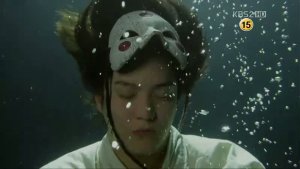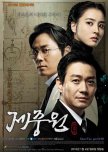This review may contain spoilers
**Note: this review contains minor spoilers. **
There are dramas that you watch and shortly forget about. There are dramas that you occasionally recall, but are not too memorable. Then, there are dramas that remain with you for a long time and immediately come to mind when asked about good dramas in general. Jejoongwon undoubtedly belongs to the last group. It has a “complete package” that is sure to please its viewers.
Jejoongwon tells the true story of the first western medical hospital in Joseon era Korea. There are three central stories to Jejoongwon: the so called “rags-to-riches” story, the rivalry between two very competent people story, and the love story. All of these sub-stories are told in a very different manner than most k-dramas, and provide something for everyone to enjoy.
The “rags-to-riches” part presents a man, Hwang Jung, belonging to the lowest class in the Korean caste system, the butchers (who were considered so low in status, they weren’t even allowed to have family names and were referred to by nicknames given to each other), who defies all obstacles (and there are many!) to become one of the first physicians of Korea.
The rivalry is between Hwang Jung and Beak Do Yang, the son of a nobleman with a keen interest in western medicine. The two have a natural affinity to medicine and are both outstanding at what they do, but one will always be better. The progression is unlike what many would expect, and doesn’t overpower the larger story at hand.
The main romance is between Hwang Jung and Yu Seok Ran, the daughter of an interpreter. Their romance is very gentle and gradual, but very fervent and touching nonetheless. Yu Seok Ran is a very unique k-drama heroine. She is ahead of her time, intelligent, kind, and self-assured. She also has a wonderful relationship with her father that is very moving and hard to come by.
At its core, Jejoongwon depicts the lives of three very different people who all see a similar future for Korea. They recognize that times are changing, and aid in the modernization of Korea through medicine.
The story is extremely well written. Taking historical events and rewriting them into a drama must be a difficult task, but it was executed very well. The characters were well developed and scene transitions were especially done well.
The acting was exceptional also. The casting of roles was very fitting for the characters. The role of Hwang Jung was played to perfection by Park Yong Woo. Hwang Jung is a man that has had to be invisible when facing member of the other classes for all of his life. He was not allowed to look at them directly, and needed to stick to the butcher’s neighborhood as much as possible or else be beaten and spit on. This causes confusion for someone who was instilled with these ideas since childhood and now has to live among people of the upper classes. Everything from Park Yong Woo’s facial expressions to body language expressed exactly what Hwang Jung was feeling throughout the story, a feature that is hard to find in many actors. Han Hye Jin has a great screen presence and brought Yu Seok Ran to life beautifully. Yun Jung Hoon also did a good job as Beak Do Yang, though not great.
Jejoongwon has one of the best OST’s I’ve heard in a while. The music fit the story well and increased emotional reactions to the scenes at hand.
The cinematography was not outstanding, but there were a few shots that were admirably filmed. I do wish there were more of those shots, but I was satisfied with everything else being done well.
In short, this was a very well produced drama that has sadly been overlooked, but deserves its recognition. A great story, excellent acting, plus a good OST to intensify the viewing experience, I recommend to this to everyone who has not had the chance to watch it.
**I have tried to make this review as objective as possible, but it is very hard to do with something that has moved me this much.**
Was this review helpful to you?


























